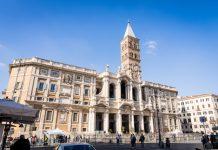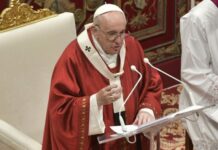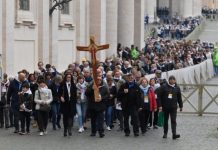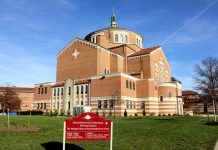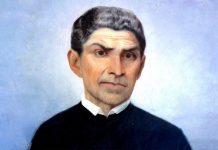November 23, the Church remembers the memory of Pope Saint Clement I. In all phases of history the infernos have waged terrible onslaughts against the Church, but there have also been specially called souls whose perseverance and fidelity have served as instruments for the fulfillment of the divine promise.
Newsroom (23/11/2020 16:00, Gaudium Press) The origin of this holy man is surrounded by mystery. According to some authors, he came from an illustrious birthplace, son of Senator Faustinian, a relative of Emperors Vespasian, Titus and Domitian. For others, he was born into a slave family and was later freed. It doesn’t matter the condition of his birth, because, considering it from a supernatural point of view, both versions agree: he was Pontiff of the Holy Church, the highest dignity to which one can ascend, having first been freed from the slavery of sin by the Redemption of Our Lord Jesus Christ.
Some chroniclers identify him with the one praised by St. Paul in the Letter to the Philippians: “They labored with me in the Gospel, with Clement and the rest of my fellow workers, whose names are written in the book of life” (4:3).
Thus, before sitting on the Throne of Peter, he behaved as a worthy successor of the Apostle of the Gentiles in his zeal and dedication to the Christian cause. He was so imbued with the spirit of Christ and had allowed himself to be taken up by Him, that his conviction and example were a constant invitation to follow the Savior. Countless pagans embraced the Faith, and Christians generously set out on the narrow paths of perfection.
Successor of Peter in the Church of Rome
How was he elected? To answer the question, it might be worth turning our attention to the figure of the Fisherman himself, as described in the Gospels.
While he was casting his nets on the Lake of Gennesaret, everything was presented to Simon from the ordinary perspective of the men of his time. Suddenly the Divine Master calls him and makes him the Prince of the Apostles, the rock on which the Holy Church would be built. Our Lord ascends to Heaven and remains somehow present on earth in the person of his Vicar, who begins the great work of converting the world.
The years went by and he saw the words of the Savior come true: he became a fisher of men (cf. Mt 4:19) and was feeding the Lord’s sheep (cf. Jn 21:17). But for this, how many obstacles, persecutions, heresies, in short, how many adversities he had to face with a strong spirit!
As time passed, he felt the fulfillment of Jesus’ last prophecy approaching: “When you are old, you will stretch out your hands, and another will gird you and carry you where you do not wish to go” (Jn 21:18). The day of his martyrdom was approaching, and St. Peter did not worry about himself, because he knew that he would meet again the One whom he loved and longed for so much. But what would become of the Church? With his departure, who would guard her from error, protect her in the dangers, strengthen her in the difficulties? Who would guide her toward the perfection God had reserved for her?
His eyes, filled with concern, went through one by one of the faithful and rested on Clement. Contemplating his soul, Peter could echo Simeon’s words – “Now, Lord, let your servant go in peace” (Luke 2:29) – for he had found an answer to his concerns.
This is what we can conjecture from Tertullian’s account, who states that it was St. Peter who, at the hour of his death, elected St. Clement as his successor in the Roman Episcopate.
God, however, would have required of him a proof of unselfish love, for the one who assumed the Chair of Peter, as the History of the Popes records without revealing the reasons, was Linus. Linus was succeeded by Anacletus, and it was only after the latter’s death that Clement finally ascended to the papal see, around the year 88 AD.
First exercise of the Roman Primacy
As a good shepherd and father, he shepherded the Lord’s flock by healing and also by admonishing. When, around the year 95, news reached him that the members of the Christian community of Corinth, who had already been the object of St. Paul’s concerns, were still facing constant conflicts and divisions, he addressed to them the famous letter that “constitutes the first exercise of the Roman Primacy after the death of St. Peter”.
In the first lines he clearly states the reason for the missive: “One no longer walks according to the directives of his precepts, nor behaves any longer in a manner worthy of Christ. On the contrary, each one walks according to the passions of his bad heart.”
Employing much delicacy and tact, St. Clement then joins the Corinthians’ efforts on the road to perfection: “We are in the same arena, and the same combat awaits us. Let us, therefore, leave empty and useless worries, and follow the glorious and venerable norm of our tradition. Let us see what is good, what pleases and what is acceptable before Him who created us. Let us keep our eyes fixed on the Blood of Christ, and understand how precious it is to His Father. Spilled for our salvation, it brought the grace of repentance to the world.”
Once the error is pointed out, he tries to lift their minds, showing them the greatness of the call God has given us; he gives advice and practical explanations, and urges them to persevere in adversity.
Beautiful description of the identity of the Church
However, the Letter to the Corinthians is, more than a solution to a concrete problem, a broad and beautiful description of the identity of the nascent Church and its mission. For “if there were abuses in Corinth,” Clement observes, “the reason must be sought in the weakening of charity and other indispensable Christian virtues.”
To reach his goal, the Pontiff “emphasizes that the Church has a sacramental structure, not a political one. God’s action which comes to meet us in the Liturgy precedes our decisions and our ideas. The Church is above all God’s gift and not our creature, and therefore this sacramental structure does not only guarantee the common order, but also this precedence of God’s gift, which we all need.”
Exiled by order of the emperor
As soon as he finishes his greeting, in the mentioned Letter to the Corinthians, he recalls the difficult times in which they lived: “Brothers, because of the unforeseen misfortunes and adversities which happened to us one after the other” …
In fact, after the death of Emperor Nero, in the year 68, there came a time of peace, which lasted through the reigns of Vespasian and Titus. However, when Domitian ascended the throne, in 81, a new storm was brewing, for the emperor intended to be worshiped as a god by his subjects, to which the Christians could not submit… This refusal, added to a financial issue, caused the hatred of the pagans to be reborn with vigor, and the climate of terror, persecution, and death was reestablished. Despite “the strictest prohibition of Christianity,” it continued to grow stronger.
In the year 98 Trajan took over the government of the empire, continuing the persecution of his predecessor. Before those who considered perseverance in religion a crime, St. Clement was accused of “sacrilege, impiety, disobedience to imperial edicts, and blasphemy against the gods.”
If the antipathy toward ordinary Christians was great, it became even greater toward the one who was considered the soul and head of Christianity.
Before the tribunal, the condition for freedom was only one: deny the Faith and sacrifice to the gods! The Holy Pontiff refused. Many attempts were made to persuade him because his apostasy would bring a large part of Christendom behind him. All in vain. He remained unyielding! By imperial decree, he was deported to the Táuric Quersoneso to work in the quarry. Many faithful people voluntarily accompanied him in his misfortune.
When evil seemed to have won…
Far from being intimidated, he derived great benefit for Christianity from his exile, for, in light of the miracles he performed, people flocked to see him. By preaching Jesus Christ to the barbarians, he converted hundreds of people and administered Baptism to them. “The idols were torn down, their temples demolished, the groves dedicated to them hewn down, and within a year, seventy-five churches were erected in honor of the true God.”
This was the reason that the Emporer sent another with an order to reverse the situation by means of torture. He considered a way in which, he thought, even the memory of the Holy Father would be erased: he would throw him into the open sea with an anchor tied around his neck, so that Christians would not be able to preserve his relics and would end up forgetting him.
Evil seemed to win out… The reality, however, was quite different! Shortly after his death, Clement’s disciples gathered together to ask God to reveal the whereabouts of the body of their holy shepherd. During the prayer, the sea withdrew and, following the movement of the waters on dry foot, they found “a small marble chapel, with an admirable structure, built by the hand of Angels, where the body of the holy martyr rested, and beside it, the anchor, which had been the instrument of his torture.
Fulfillment of the divine promise
In all phases of history, the devil has waged terrible onslaughts against the Church, more or less subtle or violent, depending on the specific circumstances; in each period, however, there have also been specially called souls, whose perseverance and fidelity have served as instruments for the fulfillment of the divine promise.
The third successor of Peter was one of those solid bastions that mark the history of the Church. Hovering above the bloody persecutions, he knew how to be a faithful transmitter of the spirit of Christ, which he had absorbed with ardent fervor in St. Peter and St. Paul. He corrected errors, taught true doctrine, stimulated and strengthened virginity, made order and hierarchy shine.
Saint Clement of Rome, in short, made the Church win and grow in an admirable way during his pontificate.
Text extracted, with adaptations, from the magazine Heralds of the Gospel n. 203. November 2018. Fr. Luis Alberto Blanco Cortés, EP.
Compiled by Camille Mittermeier




